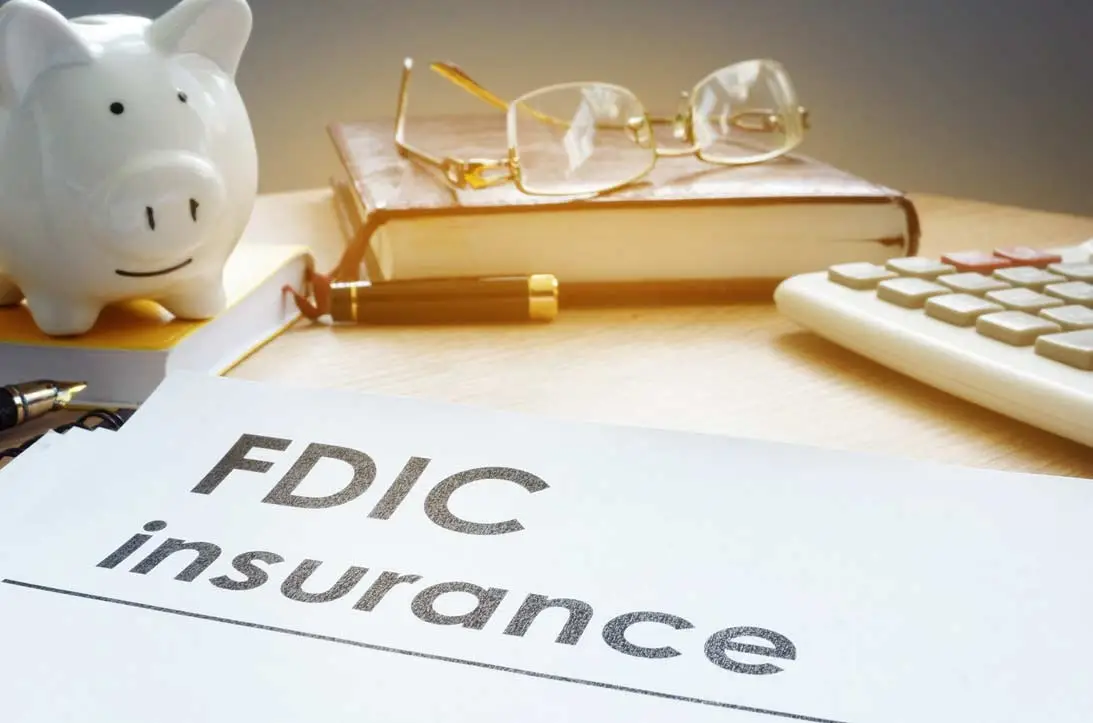In today’s uncertain financial landscape, protecting your company’s financial assets is more important than ever. Fortunately, FDIC insurance plays a crucial role in this process, acting as a reliable shield for your business finances.
In this blog, we’ll help you gain a clear understanding of what it is, how it operates, and why it’s a cornerstone of financial security for entrepreneurs and business owners. Discover how FDIC insurance can provide you with peace of mind, ensuring that your business is well-protected against unexpected challenges and risks.
What Is FDIC Insurance?
FDIC insurance, or Federal Deposit Insurance Corporation insurance, is a government-backed program in the United States that provides protection and coverage for deposits made by individuals and businesses in banks and savings associations. This insurance ensures that it safeguards the deposits of eligible account holders up to a certain limit if a bank experiences financial difficulties, such as bankruptcy or closure.
FDIC insurance covers deposit accounts, which include savings accounts, checking accounts, certificates of deposit (CDs), money market accounts, and certain retirement accounts in FDIC-member banks. The basic coverage limit is up to $250,000 per depositor, per insured bank, for each account ownership category.
FDIC insurance and SIPC (Securities Investor Protection Corporation) are distinct insurance programs, each with unique coverage for various financial institutions and products. Understanding the differences is essential to ensure financial assets are appropriately protected. Here is how they differ:
- The FDIC primarily protects depositors’ funds held in banks and savings institutions, while SIPC protects investors’ assets held in brokerage firms and securities firms.
- FDIC insurance covers deposit accounts, including savings accounts, checking accounts, certificates of deposit (CDs), money market accounts, and certain retirement accounts in FDIC-member banks. On the other hand, SIPC insurance covers the custody and protection of securities, such as stocks, bonds, mutual funds, and other investment products, held in brokerage accounts.
- FDIC insurance does not cover investments in stocks, bonds, mutual funds, or other non-deposit financial products. SIPC insurance does not protect against the decline in the market value of securities held in brokerage accounts.
Understanding the Functioning of FDIC Insurance
The FDIC insures deposits made by individuals, businesses, and other entities against the loss of funds due to bank failure, insolvency, or other financial difficulties. If a bank covered by FDIC insurance fails, depositors do not lose their insured deposits. The coverage of each insured account, up to a certain limit, includes principal and accrued interest until the end of the day the bank closes.
Although the FDIC is a government-affiliated agency, it doesn’t rely directly on taxpayer funds in case of a member bank’s failure. Instead, its priority is facilitating the sale of deposits and loans from the troubled institution. In the event of a sale, the new institution transfers the insured accounts, ensuring the security of the insured funds.
In cases where the FDIC cannot sell the failed institution’s assets, it will access its own reserves funded by premiums contributed by banks, not taxpayer funds. These reserves compensate the insured deposit balances of the impacted customers. This reimbursement process is typically completed within a few days following the bank’s closure.
Moreover, the level of protection remains the same for funds deposited in any FDIC member bank, irrespective of the bank’s size. Whether it is a community bank or a large national institution, the insured deposits enjoy the same security within any FDIC member institution.
What Happens If Your Business Holds Assets Above the Threshold Limit?
Businesses can benefit from FDIC protection of up to $250,000 at an insured bank. Exploring strategies is essential for businesses exceeding the threshold to ensure full fund coverage. A few available options are listed below:
- Diversify by opening accounts at multiple FDIC member banks. Keep interest account deposits low to stay under the $250,000 limit, including accrued interest. Once the account reaches this limit, consider opening a new account at a different member bank.
- Consider adding another account owner for joint accounts. These shared accounts extend coverage limits to each owner.
- Apart from single and joint accounts, FDIC insurance covers various ownership categories. Getting an account in a different category adds protection. Other ownership categories include:
- Corporation
- Partnership and unincorporated association accounts
- Revocable and Irrevocable trust accounts
- Certain retirement accounts
- Employee benefit plan accounts
- Government accounts
- Moving funds to a credit union provides extra protection. Their insurance is called the National Credit Union Share Insurance Fund, similar to FDIC.
- Opt for a provider that collaborates with several banks, enabling them to distribute deposits across these banks. This approach ensures that each of your deposits in these banks is protected up to the FDIC-insured limit of $250,000.
- Select an FDIC-insured bank that is also a member of the Depositors Insurance Fund (DIF), which provides additional coverage for funds exceeding the FDIC limit.
Coverage for Business Accounts with FDIC Insurance
For business accounts, the types of deposits that qualify for FDIC coverage include, but are not limited to:
- Checking accounts
- Savings accounts
- Money market deposit accounts
- Certificates of deposit (CDs)
- Cashier’s checks
- Money orders
To be eligible for FDIC business account coverage, the depositing entity (e.g., corporation, partnership, LLC, or unincorporated organization) must:
- Comply with relevant state laws.
- Have a primary purpose other than increasing FDIC coverage.
Exclusions to Coverage in FDIC Insurance
FDIC coverage does not apply to several non-deposit investment products, even if purchased from an insured bank. These include investments in stocks, bonds, mutual funds, crypto assets, life insurance products, and Treasury bills, bonds, or notes. Treasury securities are highly secure because the unwavering faith and credit of the U.S. government backs them.
The value of these investments varies with markets; no profit guarantees exist. Many sellers are not bank employees but have third-party affiliations. Be vigilant about FDIC insurance.
Remember, FDIC doesn’t cover safe deposit box contents or theft-related losses.
Benefits of Having FDIC Insurance
Here’s how FDIC insurance can be a game-changer for your business:
- FDIC insurance provides you with peace of mind, assuring that your hard-earned money is safeguarded even in the face of a bank’s financial troubles or closure. Knowing that your deposits are protected helps alleviate concerns about the safety of your funds.
- It promotes financial stability for individuals and businesses like yours by encouraging you to keep your money in banks. This fosters economic stability by ensuring the availability of capital for lending and investment.
- This safety net applies to different deposit accounts, such as savings, checking, and CDs. It’s accessible to a wide range of people and businesses. The best part? It comes automatically at no cost to you as a depositor.
- It applies uniformly, regardless of the bank’s size. This ensures equal protection for your funds, regardless of where you choose to bank.
Limits of FDIC Insurance Coverage
The table presented below contains insurance details sourced from the FDIC Insurance website.
FDIC Coverage limits
| Account Ownership Category | FDIC Insurance limit |
| Single Accounts | $250,000 per owner |
| Joint Accounts with two or more owners | $250,000 per co-owner |
| Certain Retirement Accounts, Including Individual Retirement Accounts (IRAs) | $250,000 per owner |
| Revocable Trust Accounts | $250,000 per owner per unique beneficiary |
| Irrevocable Trust Accounts | $250,000 for the non-contingent interest of each unique beneficiary |
| Corporation, Partnership & Unincorporated Association Accounts | $250,000 per corporation, partnership, or unincorporated association |
| Employee Benefit Plan Accounts | $250,000 for the non-contingent interest of each plan participant |
| Government Accounts | $250,000 per official custodian |
Although FDIC insurance is a valuable safety net for protecting deposits in banks and financial institutions. It does not cover losses due to fraud or theft. FDIC insurance does not reimburse these losses if there is a fraudulent withdrawal of funds from your account or unauthorized transactions due to theft.
Also, it may not cover all deposits for certain accounts due to coverage limits and specific account ownership categories. Depositors need to be aware of these limitations to ensure their funds are adequately protected.
Conclusion
FDIC insurance is a crucial safeguard for business accounts, providing protection, stability, and peace of mind. By understanding the coverage limits and taking proactive steps to manage your accounts effectively, your business can ensure that it benefits fully from the security offered by FDIC insurance.
Important points to remember to ensure proper FDIC insurance coverage for your business accounts:
- Familiarize yourself with the FDIC insurance coverage limits.
- Review your business account structure to ensure that your deposits are spread across different account ownership categories or banks to maximize FDIC coverage.
- Monitor account balances closely and consider adjusting account arrangements, especially if they approach or exceed the coverage limits.
- Explore various types of business accounts and their specific FDIC insurance rules, especially if your business has specialized needs or holds large balances.
- Check for updates regularly in FDIC insurance coverage limits and terms, as they may change over time.
To know more about insurance for businesses, check our insurance section of Sifter.
Frequently Asked Questions
Does FDIC insurance cover business accounts?
Yes, FDIC insurance does cover business accounts. It provides insurance protection for a wide range of deposit accounts. It ensures safeguarded business deposits up to a certain limit if your bank were to experience financial difficulties or fail. However, knowing the coverage limits and account ownership categories is essential to ensure your business accounts are adequately insured.






